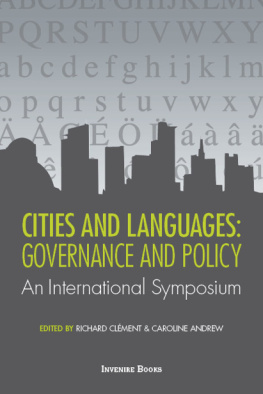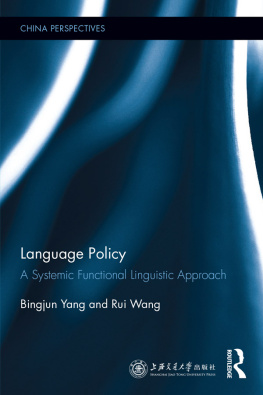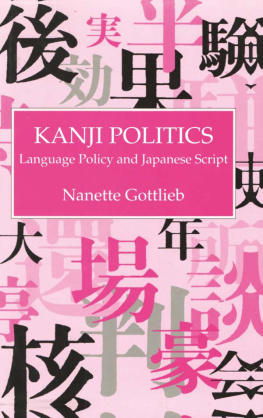LANGUAGE PLANNING AND LANGUAGE
East Asian Perspectives
Editedd by Nanette Gottlieb and Ping Chen
This book examines the major issues of language planning and policy in Japan, Mainland China, Hong Kong, Taiwan, Korea and Vietnam, particularly those relating to the selection of official language, script, and written language. Readers will be able to observe and compare how these ountries and regions, which were all strongly influenced by Confucianist doctrines originating in China in pre-modern times and adopted the logographic Chinese script as the sole or supplementary writing system for their indigenous languages, have handled the various issues of language planning and policy on the road to modernization.
LANGUAGE PLANNING AND LANGUAGE POLICY
EAST ASIAN PERSPECTIVES
LANGUAGE PLANNING AND LANGUAGE POLICY
EAST ASIAN PERSPECTIVES
EDITED BY
NANETTE GOTTLIEB AND PING CHEN
CURZON
First published 2001
by Curzon Press
Richmond, Surrey
http://www.curzonpress.co.uk
Editorial Matter 2001 Nanette Gottlieb and Ping Chen
Typeset in Sabon by LaserScript Ltd, Mitcham, Surrey
Printed and bound in Great Britain by
TJ International, Padstow, Cornwall
All rights reserved. No part of this book may be reprinted or reproduced or utilised in any form or by any electronic, mechanical, or other means, now known or hereafter invented, including photocopying and recording, or in any information storage or retrieval system, without permission in writing from the publishers.
British Library Cataloguing in Publication Data
A catalogue record of this book is available from the British Library
Library of Congress Cataloguing in Publication Data
A catalogue record for this book has been requested
ISBN 0-7007-1468-5
Contents
| Nanette Gottlieb and Ping Chen |
| Nanette Gottlieb |
| Ping Chen |
| Ping Chen |
| Ping Chen |
| Ping Chen |
| Jae Jung Song |
| Joseph Lo Bianco |
This volume is a collection of studies on language planning and policy in Japan, Korea, Viet Nam and areas where Chinese is spoken. It seems useful to bring together a book which introduces readers to the many and varied issues which have attracted the attention of language planners in these countries and regions. Our aim is to provide readers with a broad-brush picture of the major issues which have led to language planning and policy activities in East Asia and have produced the great diversity of linguistic landscapes therein today. The book is intended for upper-level undergraduate students, for graduate students and other researchers, and for educated readers with an interest in Asia in general and in language issues in particular (or the other way around).
Part of the work in appeared in Chen, P. 1994, Four projected functions of new writing systems of Chinese, in Anthropological Linguistics 36 (3): 366381. Permission by the publishers to use the copyright materials is gratefully acknowledged. The chapter on Korean is a revised version of an article previously published in The New Zealand Journal of East Asian Studies (Song, J. J. 1994, Language policies in North and South Korea, in New Zealand Journal of East Asian Studies 2: 4960). The chapter contains substantially new sections as well.
Chinese, Japanese, Korean and Vietnamese names are given throughout the book in the usual order of surname first. The modified Hepburn system of romanization is used in the chapter on Japan, the pinyin system in the chapters on Chinese, and the Yale system in the chapter on Korean, except when referring to original sources which have used differing systems
Nanette Gottlieb is Reader in Japanese in the Department of Asian Languages and Studies at the University of Queensland. She is the author of Language and the Modern State: The Reform of Written Japanese (Routledge, 1991), Kanji Politics: Language Policy and Japanese Script (Kegan Paul International, 1995) and Word Processing Technology in Japan: Kanji and the Keyboard (Curzon, 2000).
Ping Chen is Reader in Chinese in the Department of Asian Languages and Studies at the University of Queensland. He is the author of Modern Chinese: History and Sociolinguistics (Cambridge University Press, 1999), and has published widely in international journals such as the Journal of Pragmatics, International Journal of the Sociology of Language, Language Problems and Language Planning, and Language in Society.
Jae Jung Song is Senior Lecturer in the Department of Linguistics at the University of Otago, New Zealand. He is the author of Causatives and Causation: A Universal-Typological Perspective (Addison Wesley Longman, 1996), and the co-editor of Case, Typology and Grammar (John Benjamins, 1998). His book Linguistic Typology: Morphology and Syntax was published by Pearson Education in 2001.
Joseph Lo Bianco is Chief Executive of Language Australia: the National Languages and Literacy Institute, and is also Director of the Research Centre for Language and Literacy Policy at the Australian National University. He is Professorial Fellow, Faculty of Education, University of Melbourne, and Adjunct Professor, Faculty of Education, University of Technology, Sydney. Professor Lo Bianco is the founder of the National Languages and Literacy Institute of Australia and the author of Australia's first language policy, the National Policy on Languages (1987). Recent publications include the co-authored Australian Literacies: Informing National Policy on Literacy Education and Language and Literacy: Australia's Fundamental Resource (the Discipline Research Strategy for the Australian Research Council), as well as a co-authored book on intercultural education entitled: Striving for the Third Place: Intercultural Competence through Language Education.
Nanette Gottlieb and Ping Chen
Few other issues link or divide people and communities to the same extent as language. Language has been used to define the parameters of nation states, to define ethnicity, to differentiate between cultural conservatism and modernist progress and in diglossic situations to distinguish between rulers and ruled, educated and ignorant.
The topics under discussion in this volume illustrate the manner in which significant matters relating to language have been dealt with in some of the countries and regions in East Asia. We introduce readers in the following chapters to the many and varied issues which have attracted the attention of language planners in these areas. Geographical, historical and linguistic factors combined lend coherence to the volume. In keeping with common usage, we use the term East Asia in its broadest sense, to include Viet Nam from the south-east as well as Japan, the People's Republic of China, Hong Kong, Taiwan and Korea from the north-east. There are of course many other countries within that geographical spectrum, but it is not our intention to produce an encyclopedic coverage of the region. While it might be argued that Singapore deserves a place in any study of language planning in East Asia, so much good material is already available on the Singapore experience (cf. Kuo 1984, for instance) that we have chosen instead to concentrate on areas less extensively researched.







